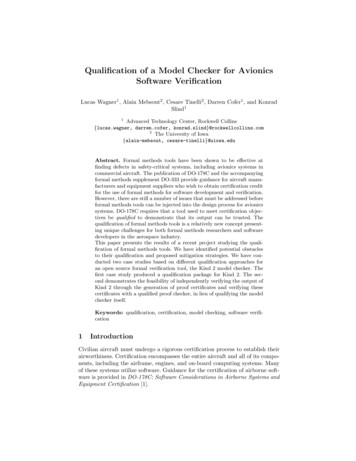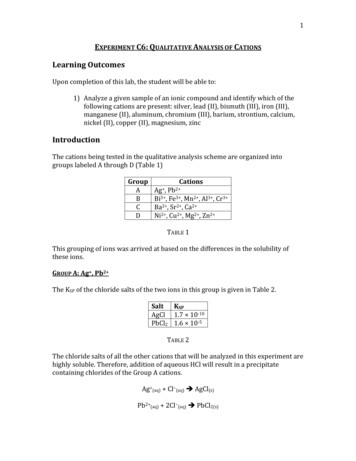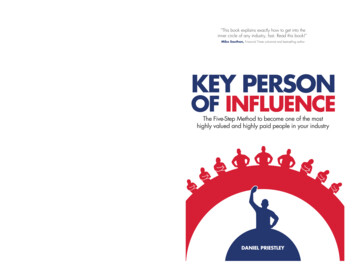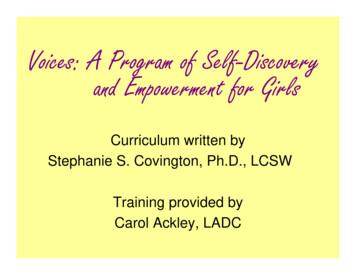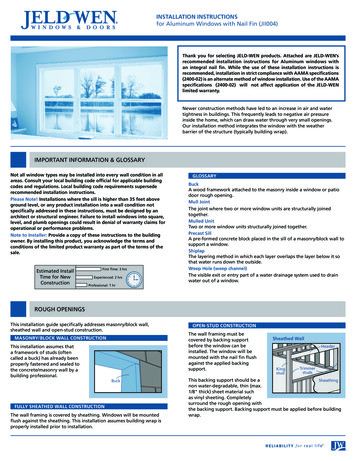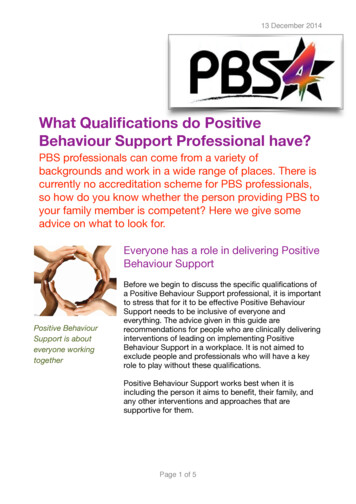
Transcription
13 December 2014What Qualifications do PositiveBehaviour Support Professional have?PBS professionals can come from a variety ofbackgrounds and work in a wide range of places. There iscurrently no accreditation scheme for PBS professionals,so how do you know whether the person providing PBS toyour family member is competent? Here we give someadvice on what to look for.Everyone has a role in delivering PositiveBehaviour SupportPositive BehaviourSupport is abouteveryone workingtogetherBefore we begin to discuss the specific qualifications ofa Positive Behaviour Support professional, it is importantto stress that for it to be effective Positive BehaviourSupport needs to be inclusive of everyone andeverything. The advice given in this guide arerecommendations for people who are clinically deliveringinterventions of leading on implementing PositiveBehaviour Support in a workplace. It is not aimed toexclude people and professionals who will have a keyrole to play without these qualifications.Positive Behaviour Support works best when it isincluding the person it aims to benefit, their family, andany other interventions and approaches that aresupportive for them.Page 1 of 5
13 December 2014A community-wide approach to Positive Behaviour SupportThe diagram below demonstrates how Positive Behaviour Support should work ondifferent levels. This will mean a level of competence in Positive Behaviour supportis needed by a wide range of people.Supportive Communities:Positive Behaviour Support should lead to valued roles for the person in thecommunities they spend time in, which in turn leads to communities where theperson is respected, valued, and has opportunities to join in. For children the schoolwould be included part of their community.Supportive Environments:This refers to places where the person spends their time, including the people whothey spend time with. Supportive environments enable the person to beindependent and develop skills, regardless of their disabilities. For example, ifsomeone uses sign supported language, all people who spend time with them willknow how to sign.Supportive approaches to the person:This describes general advice or support plans for how to support the person. Thishelps everyone who is part of their support to do things consistently.Direct 1:1 input:These are specific sessions with the person, usually aimed at increasingindependence and skills.Page 2 of 5
13 December 2014QualificationsWithout anappropriatelyqualified person,PositiveBehaviourSupport can bemisunderstoodand doneincorrectly.If a service is called a Positive Behaviour Support service,somewhere in the team’s structure there will be an appropriatelyqualified person. This person will need to be able to complete afunctional assessment of behaviour – an assessment to helpunderstand the reasons why a behaviour happens. Without anappropriately qualified person in the team, approaches of PositiveBehaviour Support can be misunderstood and done incorrectly.This can result in approaches being unsuccessful, or at worst theycould be harmful.There are three things to consider when seeing if a person isappropriately qualified: Their registration with a professional body their level of training and that they receive appropriate clinical supervision.All three are equally important and essential for Positive BehaviourSupport professionals.RegistrationProfessional registration means that the practitioner will beregulated by a professional body and they will have a code ofconduct they need to adhere to. You will be able to search thesebodies to check if people are registered by going to their websites.There are three recognised bodies a practitioner may be registeredwith: The Behavior Analyst Certification Board (BACB) – Practitionersregulated by the BACB will use the title Board Certified BehaviourAnalyst (BCBA). Details of this professional body can be found here:http://bacb.com/ The Nursing & Midwifery Council (NMC) – Practitioners regulatedby the NMC doing Positive Behaviour Support are likely to beRegistered Learning Disability Nurses. Details of the NMC can befound here: http://www.nmc-uk.org/ The Health Care Professionals Council (HCPC) – The HCPCregulates other health professionals. Professionals they regulatewho are Positive Behaviour Support practitioners are likely to beClinical Psychologists, but may also include other professionalssuch as Speech & Language Therapists or Occupational therapists.Details of the HCPC can be found here: http://www.hcpc-uk.org.uk/Page 3 of 5
13 December 2014TrainingPositive Behaviour Support is an application of Applied BehaviourAnalysis. It is recommended that a Positive Behaviour Supportprofessional should be trained to Masters level degree or higher inApplied Behaviour Analysis. This is an internationally recognisedlevel of training to be competent in the use of Applied BehaviourAnalysis as a consultant. Details of courses that have beenrecognised to provide this level of training can be found at:http://bacb.com/index.php?page 100358There are other courses that can give professionals somecompetencies in Positive Behaviour Support, such as: A Bachelors level degree in approaches to challengingbehaviour – This will provide practitioners with the skills andknowledge to practice Positive Behaviour Support, but it isrecommended their practice should be supervised andreviewed by someone with Masters level training or higher. Undergraduate courses and short courses – These willequip practitioners in some of the skills and approachesused in Positive Behaviour Support but a practitioner with ahigher level of competence will also be needed.SupervisionAll health professionals should receive appropriate supervision toensure that their practice remains current in line with the latestevidence, and it is safe and ethically sound. Usually supervisionwill be done by someone with a higher level of training, a higherposition, or more experience. This can be done by someoneinternal or external to their organisation. You can ask about thesupervision professionals receive.Raising concernsIf you have concerns about a PBS practitioner you should try toaddress this with them in the first instance. If this hasn’t resolvedthe problem or you feel you cannot do this you can ask for theiremployers complaints procedure.As the PBS practitioner should be regulated, if you are notsatisfied with the organisations response you can addressconcerns to the regulating body whose key role is to protect thepublic. Details of how to raise concerns are available on all of thewebsites above.Page 4 of 5We would not acceptsurgery from a theatrenurse who knows thenames of all the surgerytools. PositiveBehaviour Supportshould be the same.You should expect toreceive this from acompetentprofessional.
13 December 2014Key Points Everyone can have a role in delivering Positive Behaviour Support A Positive Behaviour Support Practitioner should be registeredwith a professional body (BACB, NMC, or HCPC) and should betrained to Masters level degree in Behavioural Sciences A Positive Behaviour Support Practitioner may not meet thiscriteria but may be supervised by someone with thesequalifications. It is ok to ask about levels of training and supervision of PositiveBehaviour Support Practitioners.Thinking Points Do you know the qualifications of the Positive Behaviour Supportpractitioner who is supporting your family member? Do you know what supervision the Positive Behaviour Supportpractitioner gets?Page 5 of 5
Training Positive Behaviour Support is an application of Applied Behaviour Analysis. It is recommended that a Positive Behaviour Support professional should be trained to Masters level degree or higher in Applied Behaviour Analysis. This is an internationally recognised level of training to be competent in the use of Applied Behaviour
